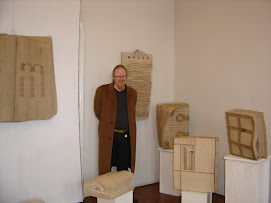Late at night I like to watch a French TV-channel called Mezzo (half classical, half Jazz/World). I soon figured out that loads of Francophone, African musicians are totally cool songwriters, singers and musicians, but of course they get next to no exposure or airplay in mainstream music.
Soon after hearing guys like Salif Keita of Mali, Baaba Maal of Senegal, and many others I started looking for their music for downloads, and found a site called Calabash Music which has this stuff. I am not affiliated in any way with them, but was very happy to use their services to get this rather hard-to-find music...
On to Pierre Akendengué - he is from Gabon, by now in his mid-60s (in fact he'll be 65 in two weeks), and obviously has a long career behind him (and a PhD in Psychology!)... Highlights include Lambarena - Bach to Africa which is really uncategorizable. It was co-produced by Hughes de Courson, who talks about the process and concept in this interview. Here is a quote from a comprehensive website on Akendengué, run by Radio France International:Akendengué’s highly original idea for his next album, Lambarena, was to fuse sacred chants from the equatorial forest region with classical cantatas composed by Johann Sebastian Bach. Akendengué and de Courson’s innovative musical project involved 250 African singers and a group of 50 French classical musicians - and the resulting album was an absolute masterpiece. Respecting the sacred nature of both the chants and the cantatas, Akendengué proved that these two radically different genres from vastly different cultures could be fused to create a totally new sound.
My wife totally digs the Bach-stuff; I prefer his earlier singer-songwriter stuff, for instance his first album Nandipo from 1974. He has a lovely tenor (the vibrato gets addictive with time), and the sparse arrangement with lots of vocal harmonies, and a little nifty percussion soothes my soul... His lyrics were apparently quite militant even back then, and he had rep. as a protest singer:Pierre Akendengué’s militant lyrics soon earned him a reputation as a protest singer. In fact, the singer’s next two albums did contain numerous tracks about specifically African themes and several songs explicitly calling for African unity, but Akendengué was not happy about being neatly pigeon-holed in this way. The singer felt there was more to his music than radical statements and fought long and hard to change the image which the media had thrust upon him.
Since my Myéné (Akendengué's native tongue) is non-existent and my French not too good, I cannot vouch for what Akendengué expresses in his lyrics, but again according to the Radio France web site:Soon afterwards, Akendengué set to work on a new album with a hard-hitting theme: the history of slavery. One of the enduring symbols of the slave trade is the isle of Gorée (just off the coast of Senegal) and the musician chose Gorée as the title of his new album, released in April 2006. In 1997, Akendengué had actually visited Gorée and his trip had proved to be an intensely emotional experience. The musician's experiences on the island led to him writing "La chanson de Gorée", which would later serve as a basis for his album about the slave trade. Akendengué claimed he had been motivated to make Gorée as a way of keeping the troubled history of slavery at the forefront of people's minds and encouraging debate. His album also raised other topical issues on songs such as "De la forêt" which evokes the plight of Pygmies in Gabon, currently being evicted from their rainforest home. Akendengué appears to be happy with his new role of spokesperson, using his music to denounce human suffering and injustice across Africa.
Sounds like some worthy ideas to me... Here is "Bekelia" ("Hope") from the Gorée album:
Here is Pierre's web site...
Pierre on MySpace...
John Ashbery, John Yau, and the movies
9 hours ago


No comments:
Post a Comment